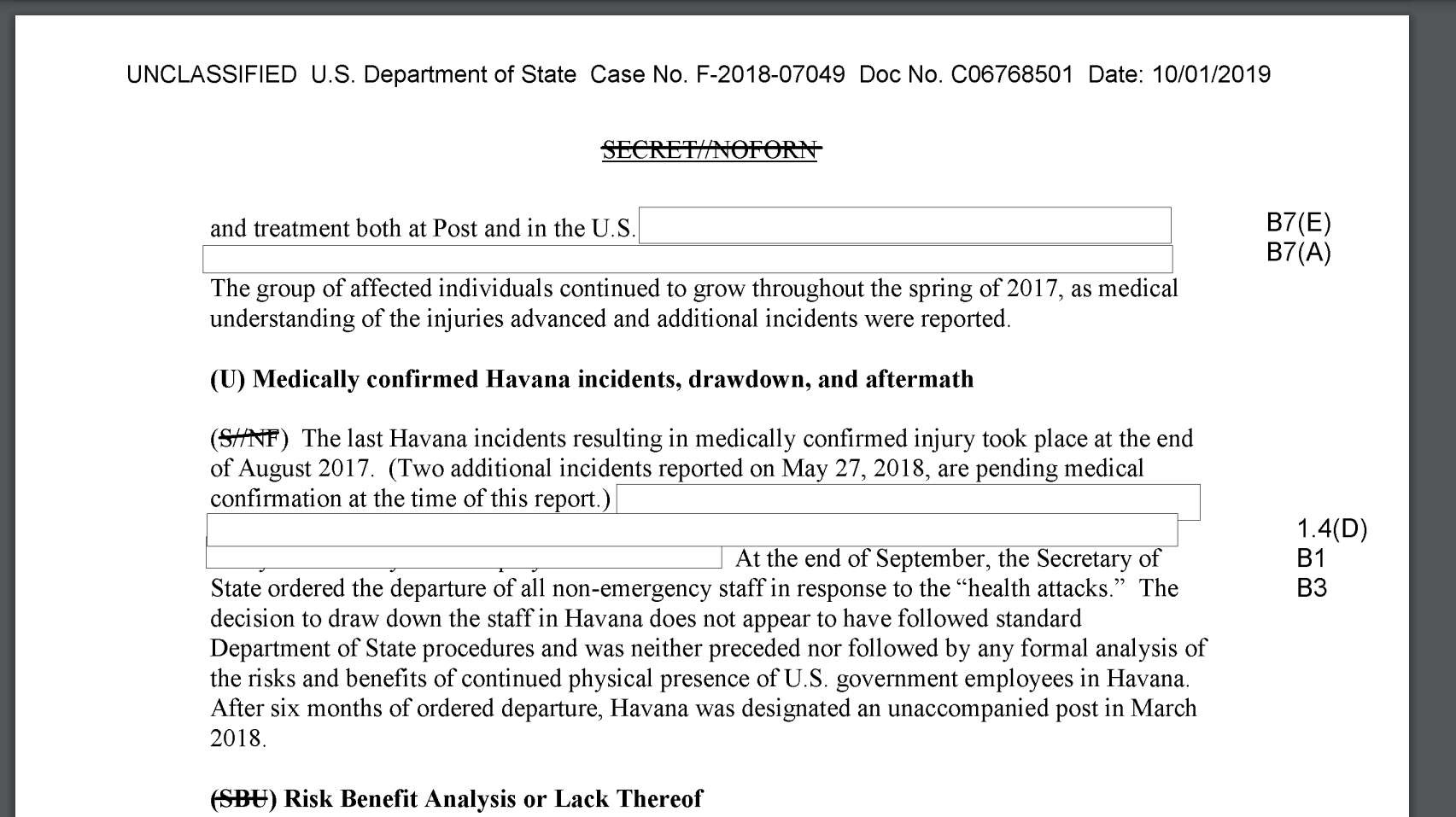A newly released report says Rex Tillerson’s State Department responded in a slow, disorganised fashion to the “Havana syndrome” — the mysterious rash of neural disorders that has plagued U.S. and Canadian diplomats in Cuba and other locations since 2016.
A previously undisclosed report from the State Department’s Accountability Review Board paints a picture of dysfunction, miscommunication and excessive secrecy during Tillerson’s tenure as Secretary of State, the likes of which prevented a thorough investigation into the rash of weird incidents that has left more than a dozen bureaucrats with brain injuries. The report was published Wednesday by the National Security Archive.
The disturbing incidents, first publicized in 2017, have seen foreign bureaucrats — mostly CIA agents — afflicted with a range of bizarre symptoms consistent with significant brain trauma. The symptoms were initially attributed to pesticide exposure and crickets, but the conversation has evolved to suggest the injuries resulted from an attack via some sort of “sonic weapon,” likely involving concentrated microwave radiation. Though the first incidents occurred in Cuba, similar episodes have since been reported in China and Uzbekistan, among other places.
Whatever the cause, the one thing we do know is that Tillerson’s State Department botched the initial response. The newly released ARB report depicts the agency’s efforts as bungling and inept, calling its response “stove-piped and largely ad hoc.” Apparently no single person was ever put in charge of coordinating a response to the incidents, nor was any State Department task force developed to address the crisis. Tillerson did make the decision to dramatically reduce staffing levels at the Embassy in Havana, but a “cost-benefit” analysis was not conducted to ensure that this decision would not lead to further dysfunctions, the report claims.
On top of this, inter-agency communication regarding the illnesses were conducted largely outside of normal “channels,” making it harder to retrospectively piece together the work that actually had been done. The report also says Tillerson’s personal failure to fill positions at the U.S. State Department contributed to the agency’s failure to respond effectively.
The report states:
“As a result, a whole-of-government comprehensive effort to identify the mechanism of injury and perpetrators, to understand the universe of potentially affected individuals, to treat and rehabilitate the injured employees as well as to deal with the many administrative issues associated with this anomalous event never emerged.”

The CIA is also blamed for undermining the investigation. In the report’s section on communication and information sharing, a passage that is obviously about the intelligence agency — but which has been heavily redacted so as to obscure the actual mention of its name — claims that both “at [Havana] Post and in Washington, response to the incidents was characterised by excessive secrecy that contributed to a delayed response.” The report further states that a future Secretary of State should “advise employees, and his counterparts at other agencies represented at missions overseas, that he expects complete transparency.”
Aside from the government’s pitfalls, one of the biggest takeaways from the report is that America still has literally no idea what is going on. Of the mysterious plague of apparent “brain attacks” on federal agents, the ARB states:
We do not know the motive behind these incidents, when they actually commenced, or who did it. We do know that USG, and Canadian diplomatic community members, were injured, but we do not know how. We do not know what happened, when it happened, who did it, or why.
Very comforting. A recently released report from the Centre for Disease Control and Prevention similarly fails to shed any light on the maladies. The CDC, which had previously been tasked with conducting an “epidemiological study” of the illnesses, states:
“The evaluations conducted thus far have not identified a mechanism of injury, process of exposure, effective treatment, or mitigating factor for the unexplained cluster of symptoms experienced by those stationed in Havana, Cuba.”
The Biden administration has vowed to do a better job when it comes to investigating the illnesses. This week, following the report’s release, the White House announced it had appointed a new senior-level adviser to coordinate a response to the illnesses. The move was announced during a press conference Thursday, during which State Department spokesman Ned Price said that the agency was working hard to uncover what had occurred.
“The U.S. government is working to determine what happened to our staff and their families and to ensure the well-being and health of our officials going forward. That investigation remains underway. It remains a high priority,” Price said.
